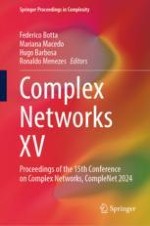2024 | OriginalPaper | Chapter
From Low Resource Information Extraction to Identifying Influential Nodes in Knowledge Graphs
Authors : Erica Cai, Olga Simek, Benjamin A. Miller, Danielle Sullivan, Evan Young, Christopher L. Smith
Published in: Complex Networks XV
Publisher: Springer Nature Switzerland
Activate our intelligent search to find suitable subject content or patents.
Select sections of text to find matching patents with Artificial Intelligence. powered by
Select sections of text to find additional relevant content using AI-assisted search. powered by
